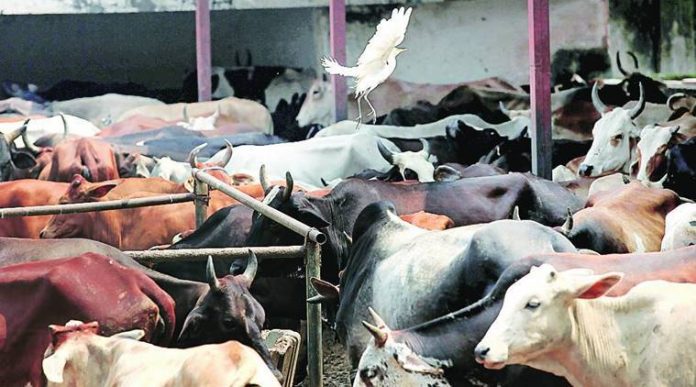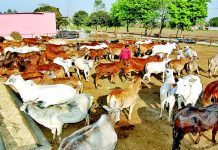This article is written by Oishiki Bansal, a student of Symbiosis Law School, Noida. This article elucidates the provisions of Article 48 of the Constitution of India and how it became a part of the Constitution.
Table of Contents
Introduction
With India being an agrarian nation, the protection and improvement of agriculture have been one of the main contentions of the Indian government. The Constitution-makers provided for Article 48 as a Directive Principle of State Policy to ensure that the cattle in India, especially cows, are protected against the potential slaughter in pursuance of agriculture and animal husbandry. The provisions of the Article follow liberalism ideology, which is based on morals of freedom, liberty, and the idea of equality before the law. The Article explains the measures taken by our Constitutional makers to ensure animal welfare in the country. This article would be dealing with how Article 48 is interpreted by the different courts of India over time and the role it plays in ensuring animal welfare and rights.
Constitutional provisions that emphasize animal welfare and animal rights
Directive principles of state policy
Part IV of the Indian Constitution states the directive principles of state policy. Article 48 and 48A of the Constitution come under part IV of the Constitution of India.
Article 48
As stated above, Article 48 provides for the organization of agriculture and animal husbandry. The Article specially mentions the preservation, improvisation of breeds, and prevention of cow slaughter, calves, and other milch animals. Cattle slaughter and especially cow slaughter is a deeply contested issue in India because of the sacred value held by cows in different religions such as Hindus, Jains, Zoroastrians, and Buddhists.
There was a debate in the constituent assembly whether to give Article 48 the position of a fundamental right or not. The constituent assembly concluded that the fundamental rights are for humans and to ensure that this provision is not forced on the people of different religions, it was decided to not give Article 48 the status of a fundamental right.
Article 48A
Article 48A also lies under part IV of the Indian Constitution. It reads as – “The State shall endeavor to protect and improve the environment and to safeguard the forests and wildlife of the country.” This section, although incapable of being judicially enforced, if taken under the ambit of Article 21, can be enforced by law. This Article states the obligation of the state to protect wildlife and forest while formulating any other law.
In the case of Sachidanand Pandey & Ors. v. The State of West Bengal & Ors. (1987), The apex court held that regarding the protection of ecology brought before the court Article 48A must be kept in mind.
Article 48 of the Indian Constitution only provided for the duties of the citizens for animal protection and welfare. The said article needed to be supplemented with other provisions to make it more meaningful and provide more strong legislation. Therefore, the fundamental right to life and fundamental duties were interpreted in such a way to supplement Article 48. The following is discussed below –
Fundamental rights
Article 21
Article 21 of the Indian Constitution ensures the right to life and personal liberty. This right is not only limited to humans but extends to all the other living creatures on our planet.
The case of the Animal Welfare Board of India v A. Nagaraja and ors. (1949) focused on a traditional sport in Tamil Nadu, namely ‘Jallikattu’. The sport involves a bull being released in the crowd and subsequently, the people trying to grab onto the hump of the bull’s back and hang onto it while the bull tries to escape. This tradition became a concern for the welfare of bulls, as when the bulls were released, they were poked with sharp sticks or scythes. Additionally, their tails were bent to fracture their vertebrae. To disorient the bulls, sometimes people used to rub chili peppers into bulls’ eyes or forced bulls to drink alcohol. During the sport, the bulls were stabbed by knives, punched, jumped on, and even were dragged to the ground.
The animal welfare board moved the Supreme Court in 2010 to ban the sport of jallikattu on the grounds of cruelty towards animals and public safety. The animal welfare board of India also sought to enforce the notification of the government of India on barring bulls from being trained or exhibited as performing animals.
The Supreme Court observed to safeguard animal life under Article 21 of the Constitution of India. It stated that Article 51 A (g) under the fundamental duties in the Constitution of India is the greater charter for animal rights. In respect to Article 21, the apex Court notably held that according to the law of land, every living creature on the land has a right to life and security. The meaning of “life”, as given under Article 21, expands to the right to life to all forms of life on the land. Any disturbance to the most basic form of environment is covered under Article 21. And as far as animals are concerned, the meaning of “life” relates to more than just survival or any kind of existence that does not lead to some intrinsic worth, honor, or dignity.
Fundamental duties
Article 51A under Part IVA of the Constitution of India lays down the fundamental duties. The Article that deals with animal rights is Article 51A(g). It reads as – “ to protect and improve the natural environment including forests, lakes, rivers, and wildlife, and to have compassion for living creatures”.
According to the Article, citizens of India are obligated to maintain and develop the natural environment, as well as to have compassion for all living beings.
In the case of the State of Gujarat v Mirzapur Moti Kureshi Kassab Jamat & ors, the apex court held that the parliament intended to enact Article 51A for the Article to be read with Article 48 and Article 48A of the Constitution.
How Article 48 was incorporated in the Constitution of India
In August 1947, a public convention recommended that the Constitution provide a policy relating to safeguarding cows from being slaughtered. Subsequently, a league was formed to protect cows for safeguarding the economic interest of the country and August 4 was declared to be National Cow Day.
Various independent organizations in the country like the Ahmedabad Bullion Association, All India Varnashrama Swarajya Sangh, and the state assemblies passed anti-cow killing resolutions. The matter reached the constituent assembly, and the newly appointed president of constituent assembly Rajendra Prasad proposed that the idea to safeguard cows should be considered as one of the fundamental rights.
One of the members of the constituent assembly, Pandit Thakur Dass Bhargava, stated that safeguarding cows is in the economic interest of the country. To improve the health and food position of the country, you need to produce a full quota of cereals and milk. He proposed that the Article be divided into 3 parts –
- The first part talks about the scientific improvement in agriculture.
- Secondly, improvement in cattle breeding.
- And thirdly, the protection of cows and other cattle from being slaughtered.
Improvement in agriculture and increase in the quantity of food are interdependent.
The drafting committee headed by Dr. B.R Ambedkar opined that fundamental rights are only for the citizens of the country and cows are not included among citizens. Also, he believed that the inclusion of Article 48 in the fundamental rights would force the other sects of the community to agree to provisions of Article 48. It will not leave a scope for further discussion and debate. The non-Hindus will have to comply with the fundamental rights without their will.
Hence, Article 48 was inserted into the Constitution as a directive principle of state policy and not a fundamental right.
States role in enacting Article 48 of the Constitution
Entry 15 of the state list, as given in the Seventh Schedule of the Constitution, gives powers to the state legislatures to enact laws relating to the conservation of cattle and the prevention of cow slaughter. Therefore, different states have different laws relating to the prevention of cow slaughter in India.

Judicial pronouncements on Article 48
Abdul Hakim Qureshi v. State of Bihar (1961)
In this case, the petitioner contended that by enforcing a law to ban cow slaughter in Bihar, Uttar Pradesh, and Madhya Pradesh, the state governments are infringing upon the Muslims’ right to freedom of religion, provided under Article 25 of the Constitution of India. The petitioner stated that according to the Muslim tradition, they are allowed to sacrifice cows on days like Bakr-id. The Supreme Court then went through Hidaya and Quran, some of the Islamic texts, and stated that none of the texts mentions the sacrifice of a cow as compulsory. A camel or goat can be sacrificed instead of a cow. Thus, a total ban on cow slaughter by the state governments does not infringe the freedom to practice their religion.
Mohd. Hanif Qureshi v. State of Bihar (1959)
In the case of Mohd Hanif Qureshi v state of Bihar(1958), the question was raised whether the ban on slaughter of cows infringes the fundamental right to trade, as given under Article 19(1)(g) of the Constitution? The Court stated that the utility of cows is a justified reason to enforce a ban on the slaughter of cows. While interpreting Article 48 of the Constitution, the Court was of the view that the mandate applies only to cows, calves, and other animals that can provide milk or function as drought relief animals. Therefore, Article 48 does not envisage a prohibition on the slaughter of all cows or cattle. The Supreme Court, therefore, held that a ban on the slaughter of buffaloes and bulls after they stop yielding milk or working as draught cattle is not justified. Therefore, the Apex Court opined that a total ban on the slaughter of cows does not infringe Article 19(1)(g) of the Constitution.
State of Gujarat v. Mirzapur Moti Kureshi Kassab (2005)
The decision in Mohd Hanif Qureshi v state of Bihar was overruled in the State of Gujarat v Mirzapur Moti Kureshi Kassab(2005). The Supreme Court held that Article 48 of the Constitution especially mentions the protection of cows from being slaughtered. It was noticed that cattle, which have been helping the human species since time immemorial, must be handled with kindness even when they are no longer useful. The Court said that after a combined reading of Article 51A and 48 provides compassionate treatment towards animals. Animals have their own set of fundamental rights.
Conclusion
Article 48 became a part of the Indian Constitution after a lot of deliberation and discussion by the Constitution makers. Although the Article specifically focuses on cows, it aims to promote and improve the agriculture and animal husbandry industry in the county. After reviewing the judicial decisions on the Constitutionality of numerous anti-cow slaughter laws, it is possible to infer that the absolute prohibition on the slaughtering of cows and their offspring is permissible under the Constitution.
References
- https://pib.gov.in/newsite/PrintRelease.aspx?relid=190923
- https://rmlnlulawreview.com/2016/08/31/cow-slaughter-and-the-Constitution-uneasy-compromises/
- https://www.animallaw.inśfo/Article/Constitutional-scheme-animal-rights-india
- https://indianexpress.com/Article/research/india-republic-Constitution-cow-constituent-assembly-Article-48-7161165/
LawSikho has created a telegram group for exchanging legal knowledge, referrals and various opportunities. You can click on this link and join:
https://t.me/joinchat/J_0YrBa4IBSHdpuTfQO_sA
Follow us on Instagram and subscribe to our YouTube channel for more amazing legal content.
 Serato DJ Crack 2025Serato DJ PRO Crack
Serato DJ Crack 2025Serato DJ PRO Crack










 Allow notifications
Allow notifications


